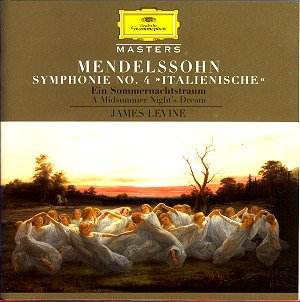|
|
Search MusicWeb Here |
|
 |
||
|
Founder:
Len Mullenger (1942-2025) Editor
in Chief:John Quinn
|
|
|
Search MusicWeb Here |
|
 |
||
|
Founder:
Len Mullenger (1942-2025) Editor
in Chief:John Quinn
|
 |
Felix MENDELSSOHN (1809
– 1847) Symphony No. 4 in A, Op, 90 (1833) A Midsummer Night’s Dream, Opp, 21 and 61 (1826 / 1842) Judith Blegen (soprano) Florence Quivar (mezzo) Berlin Philharmonic Orchestra conducted by James Levine (Symphony) recorded in Jesus-Christus-Kirche, Berlin, Op. 90, Nov 1988, Orchestra Hall, Chicago, July 1984. |
|
|
|
||
This recording or at least part of it brings back memories of the tone of the Berlin Philharmonic Orchestra in the early days, when DG (‘DGG’ as it once was) used to record nearly all of their major projects in the Jesus-Christus-Kirche. This is mainly due to the creamy tone of the oboe in the Italian Symphony. The performance of the Symphony is immaculately prepared and the playing is powerful. Exposition repeats are played and the overall conception is a somewhat larger than life performance of Mendelssohn’s perennial favourite. |
|
Return to Index |